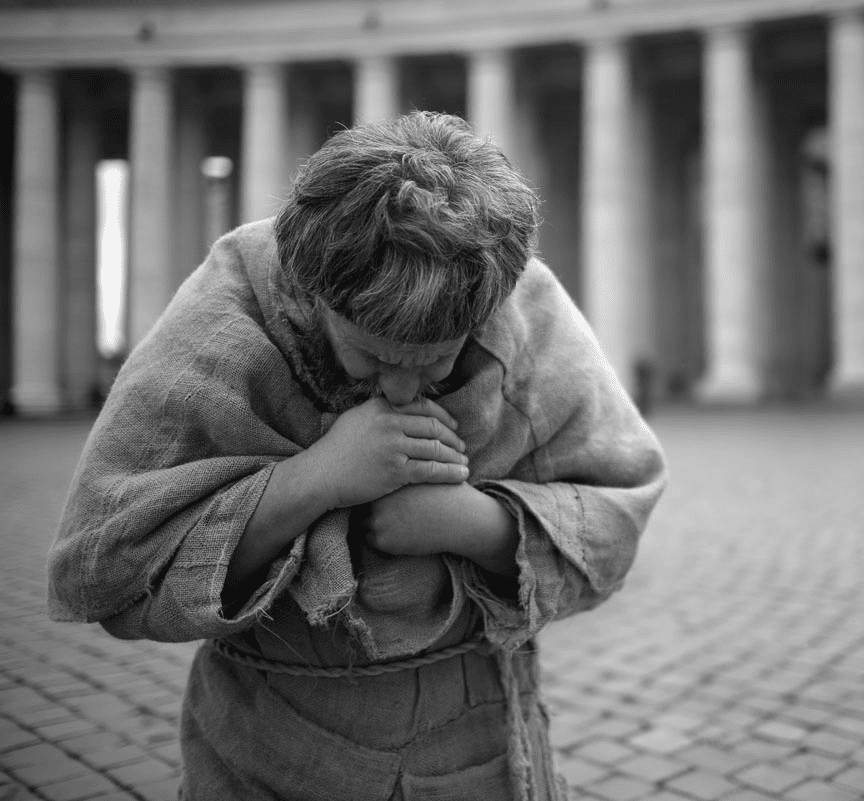[…] post The Pharisee, the Publican, and You appeared first on The Catholic […]
A blog for Catholic men that seeks to encourage virtue, the pursuit of holiness and the art of true masculinity.
The Pharisee, the Publican, and You

The Easter Triduum fast approaches. It is a time in which we remember Christ embracing the cross for the love of us, and one in which we joyfully celebrate his triumphant resurrection, which is the source of all our hope. But it is also a time of remembering what Christ saved us from, namely, our sins. Today, I want to reflect briefly on how humble repentance frees us from sin.
While many would deny it, it is a fact that we are all desperately sick with sin. It eats away at our souls like the deadly Ebola virus, and unchecked, it will inevitably lead to our spiritual death. How then do we find healing? How then are we made whole? The remedy is simple: Repentance. And there is no better illustration of repentance than the parable of the Pharisee and the publican:
He also told this parable to some who trusted in themselves that they were righteous and despised others: “Two men went up into the temple to pray, one a Pharisee and the other a tax collector. The Pharisee stood and prayed thus with himself, ‘God, I thank thee that I am not like other men, extortioners, unjust, adulterers, or even like this tax collector. I fast twice a week, I give tithes of all that I get.’
But the tax collector, standing far off, would not even lift up his eyes to heaven, but beat his breast, saying, ‘God, be merciful to me a sinner!’ I tell you, this man went down to his house justified rather than the other; for every one who exalts himself will be humbled, but he who humbles himself will be exalted.”
The Spirit of the Pharisee
How subtle is Pharisaism. How easy it is to scorn others and hold them in contempt. How natural for us to think that we are healthy and whole spiritually when in reality we are diseased and dying. We look at prostitutes, drug addicts, criminals, and those who have ruined their lives with sinful choices and think, “I’m so glad I’m not like that! I’m so glad my life isn’t a mess. Sure, I still sin (doesn’t everyone?), but at least I know God and haven’t been as immoral as others.”
In these moments when we feel like we are good, spiritual people who have it all together, we are far from God. “You say, I am rich, I have prospered, and I need nothing; not knowing that you are wretched, pitiable, poor, blind, and naked,” Christ says to us, his voice filled with grief (Rev. 3:17).
The root of this pharisaic pride is forgetting that sin is a matter of the heart, and that it is just as easy to be “wretched” in God’s eyes when we outwardly appear good as it is when we are outwardly immoral. That was the whole problem with the Pharisees—they washed the outside of the cup and ignored the inside.
A Broken Spirit
The solution to Pharisaism is the humility of the publican. The publican had no doubt he was a sinner. He saw the gravity of his sins and they overwhelmed him. There was no self-sufficiency in him. “A humble and contrite heart, thou, O God, will not despise” (Psalm 51:17).
This humility, this acknowledgement of our utter neediness, is the heart of true repentance. In God’s order of justice, only those who accuse themselves of their sins and confess like common criminals can find forgiveness, just as the one with leprosy can only find healing when he runs to the nearest physician. It is only when we are condemned in our own eyes that we find pardon.
The truth is, we are all desperately in need of God’s healing and forgiveness. Though our sins may be more subtle, they are nonetheless grave for their hiddenness. Perhaps they are more grave since their subtlety convinces us that we are well. We are all sinners; there is no place for us to despise or condemn anyone but ourselves.
This holy week, let’s embrace the spirit of the publican, and in our weakness and sinfulness, let us cry out to our Lord, “God, be merciful to me a sinner!” For he did not come to heal the well, but the sick, and if we do not acknowledge our sin, we have no part with him. As he himself said, “It is not the healthy who need a doctor, but the sick. I have not come to call the righteous, but sinners to repentance.”
Don’t Miss a Thing
Subscribe to get email notifications of new posts and special offers PLUS a St. Joseph digital poster.
Related
COMMENTS
Reader Interactions
Comments
Trackbacks
-
-
[…] note: The post The Pharisee, the Publican, and You appeared first on The Catholic Gentleman. The image is of the Pharisee and Publican – […]
I am reminded of Don Scupoli’s intro to Spiritual Combat (that I seriously just started reading yesterday) where he writes about distrust of self and trust in God. Basically, when someone truly distrusts the self they are not surprised at their sin because they know they will. Those that become angry or despair over their sin are presumptuous. This also comes from pride, and those who are prideful will (at one time or another) fall into some sinful debacle in proportion to their pride. Well done.
Well done Sam as always. What a great thought as we approach the triduum 🙂
Ellis
This was an eye-opener deep in the Lenten Season. Thank you Sam, looking forward to more great pieces.
Thank you Sam for this post. Really good to start your working by reading this, Happy Easter and God bless you in your mission!
*working day! Sorry!